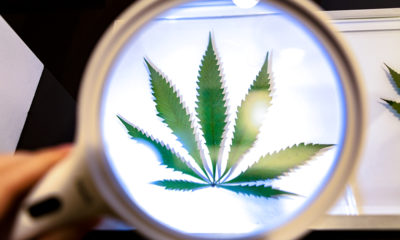
Medical
The Not-So-Great Utah Medical Marijuana Standoff
Medical cannabis is what Utah voters wanted, but not exactly what Utah lawmakers granted. And it appears the issue is headed to court — with no marijuana for waiting patients.
On Election Day, voters in Utah approved a measure legalizing medical marijuana, only to have lawmakers replace the voter-approved plan with a watered-down version. It was a turnaround that left us wondering: Is the state is a theocracy run by the Mormon church, an anti-democratic sham government, or a combination of the two?
Whatever the answer, the more pressing question of how to best provide medical cannabis to sick people in one of the U.S.’s most conservative states now appears headed to the courts following a pair of lawsuits filed last week that challenge what’s been criticized as a “backdoor” deal.
And in the meantime, for the many thousands of people in Utah for whom medical marijuana could bring relief, there appears to be no clear path towards accessing medicine in the near future, aside from the black market.
Utah has a voter-initiative process, the most popular method by which both recreational marijuana and medical cannabis have been introduced in the United States. Months of positive polling in the state showed popular support that refused to dissipate, despite avowed opposition from the powerful Church of Latter-day Saints, not to mention some dirty campaign tricks. As such, voters duly approved Proposition 2, which promised to set up a viable if more restrictive than most framework for cultivating, distributing and regulating medical marijuana.
But Utah’s process is a little bit different in that lawmakers have the legal right to unilaterally amend whatever voters approved however they see fit.
And that’s exactly what lawmakers did when they passed a “compromise” bill on Dec. 3 that was even more restrictive than Proposition 2, following some weeks of closed-door negotiations between Gov. Gary Herbert and members of the state legislature, where critics say the Mormon church enjoys outsized influence.
As the Salt Lake Tribune reported, the new bill “significantly reduces” the number of dispensaries that can hope to open in Utah from 40 to just seven. Edibles are also almost entirely banned and the list of diseases or conditions that qualify a patient for legal cannabis use was also reduced to eliminate many autoimmune diseases included in the voter-approved version of medical legalization.
Both the deal itself and the way it was reached has led to criticism that direct democracy in Utah is “just a suggestion box,” as medical marijuana advocate Christine Stenquist told the Deseret News.
Stenquist is one of the litigants in a lawsuit filed Wednesday that also challenges the constitutionality of the cannabis compromise on religious grounds. Specifically, the suit accuses elected officials of violating a constitutional provision that bans any union of church and state.
The suit was filed by attorney Rocky Anderson, a former mayor of Salt Lake City, on behalf of the Epilepsy Association of Utah and Stenquist’s advocacy organization, Together for Responsible Use and Cannabis Education. Named as defendants are Gov. Herbert as well as Dr. Joseph Miner, a physician and the executive director of the Utah Department of Health.
“In direct contravention of the expressed will of the People, Governor Gary Herbert, at the behest of the Church, called a special session of the Utah Legislature on the earliest possible date — a mere two days after the effective date of the Initiative Statute — with the intent of undermining core purposes of Proposition 2 by radically reducing and burdening the access of patients to medical cannabis,” the suit claims.
“In further direct contravention of the expressed will of the People, as reflected in the majority vote for Proposition 2, the Legislature, at the behest of the Church and as a result of the Church’s domination and interference, voted to dramatically undermine core purposes of Proposition 2 and the Initiative Statute by radically amending, and essentially replacing, the Initiative Statute with the passage of H.B. 3001, which deprives, reduces, and unreasonably burdens access to medical cannabis; drastically reduces the authorization for private facilities to sell medical cannabis; and completely eliminates the opportunity for any patients to grow cannabis for their personal medicinal use, regardless of their lack of reasonable access to a medical cannabis dispensing facility,” it adds.
An initial court date for the suit was not immediately announced. But whether it is next week or next year may not be material to Utah cannabis patients, who can look forward to lengthy arguments without much hope of relief from cannabis unless they’re able to hop in a car and head to nearby Nevada or Colorado.
In other words, it’s more of the status quo.
TELL US, are you keeping an eye on legalization initiatives in your state?
























